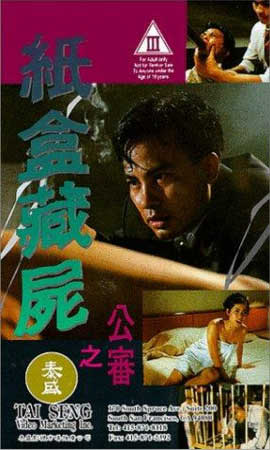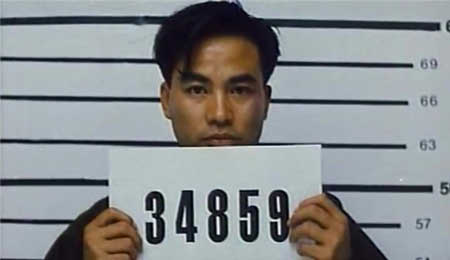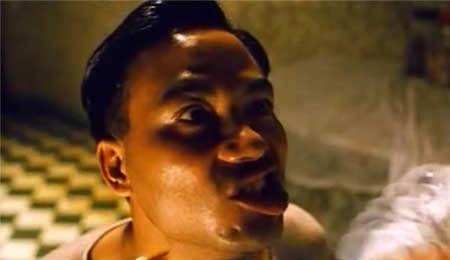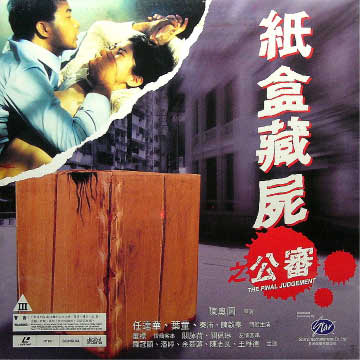
Reviewed by YTSL

Hong Kong movies are not a genre! This is a point I wish I could drum into the heads of all those people who think that the only Hong Kong movies are action movies (and maybe even only what is disparagingly termed “chop socky” at that). And 1993 sure would be a good year to give evidence of this -- on account of it being that in which were released such diverse works as “C’est la Vie Mon, Cheri”, “The Untold Story”, “The Bride with White Hair”, “The Heroic Trio”, “The Eagle Shooting Heroes”, “Tom, Dick and Hairy” and “Temptation of a Monk” as well as this Otto Chan helmed film which seemed to change genres every few minutes or so (from Category III horror to family drama to police procedural to high melodrama and so on).
That whose Chinese title literally translates
into English as “Paper Box Hide Corpse Trial” -- because it centers on the
trial of a man accused of murdering a 17 year old girl, whose mutilated naked
body was found in a cardboard box out in the Happy Valley area of the then
British Crown Colony -- is said to be based on a true story about the first
murder conviction in Hong Kong tried solely on scientific evidence.
The fact of the makers of THE FINAL JUDGEMENT not being entirely convinced
of the validity of that which is presented as running counter to the “intuitive
method” of crime detection can be seen in such ways as: The advocates
of the “scientific method” including a sniffly individual portrayed by Kenneth
Chan as well as -- in Inspector Alan Bell -- the kind of boorish and brutal
British man that the viewer is obviously meant to distrust as well as dislike;
their incorporating torture into their efforts to get an admission of guilt
from the prime suspect; and an anonymous but knowing individual being heard
to assert that “They don’t want to get the murderer. They just want
to prove [the validity of] scientific evidence”.

In contrast, the guilt (or innocence) of the family man who gets accused of doing such as cutting off the nipples of a woman as well as killing -- but not raping -- her has been presented in such a way as to make it possible for different viewers of this work -- at least, those who can’t read its written Chinese epilogue (Why oh why is this such a prevalent practice in Jade Theatre productions?!) -- to make varied interpretations and reach divergent conclusions on the matter. Put another way: It really does feel like it is left to the members of this -- at times pretty grim as well as intense -- film’s audience to individually make THE FINAL JUDGEMENT as to whether Mr. Au Pin Keung did what was done to Miss Li Lai Ying.
IMHO, it was quite the masterstroke to have Simon
Yam portray the THE FINAL JUDGEMENT’s main character. Yam endows Au
with a kind of nervy edginess that can be read as a sign of there being a
definite underlying menacing quality to the character but could just as possibly
stem from a poor working man’s rather understandable frustration at being
unable to provide as much comfort, space and happiness for his wife and young
child as he would like to do. There also appears to be little doubt
that this film’s makers were counting on viewers to be incapable of seeing
certain scenes with the very versatile actor in them without recalling the
dangerous psychos he has essayed in some other productions (and thereby create
shadows of doubt even when there ought not to have been if one had actually
approached those situations in a truly objective manner).

Cecilia Yip puts in an effective and affecting performance as well in THE FINAL JUDGEMENT as the loving housewife -- and mother of a rather irritating child named Ming Ming -- whose world threatens to crumble all around her starting from when the police went knocking on her family’s apartment door one night. “Uncle” Bill Tung and Paul Chun Pui are two veteran actors given interesting supporting roles to play in this Steven Lo production: The former as Officer Chan Kent, a police detective not at all happy with his superior officers opting for an investigative route that was revolutionary and probably not yet all that trustworthy in 1974 (the year in which much of this 94 minute length work’s proceedings take place); and the latter as Stanley Wu Tai Kit, a rare lawyer with a conscience along with a fine mind.
Unlike with some other Hong Kong movies, THE FINAL JUDGEMENT’s courtroom scenes -- especially those in which Counsel Wu does the questioning -- are by no means the weakest portions of the movie. In actuality, there is no single scene that I have definite problems with. Instead, what lowered this nevertheless often gripping offering’s quality for me is the way in which different sections were put together. In particular, its various tonal shifts were often too extreme or abrupt for optimal viewing satisfaction. Additionally, there was the fact of quite a few admittedly minor characters disappearing from the entire movie without ample ado -- and some others being introduced pretty late in the work -- that made for plot transitions that could have been handled way smoother, even if not more logically.
My rating for this film: 6.5
